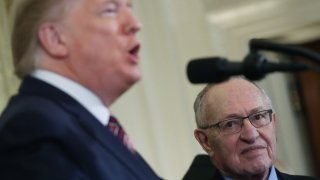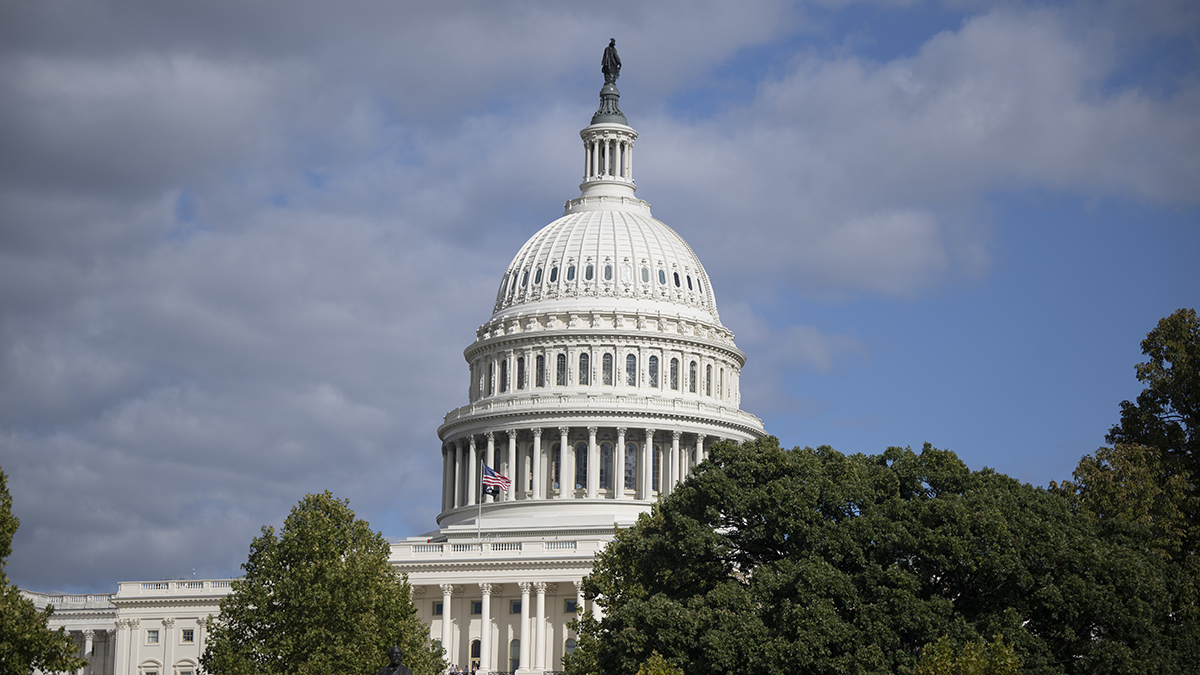
President Donald Trump's legal team issued a fiery response Saturday ahead of opening arguments in his impeachment trial, while House Democrats laid out their case in forceful fashion, saying the president betrayed public trust with behavior that was the “worst nightmare" of the founding fathers.
The dueling filings previewed arguments both sides intend to make once Trump's impeachment trial begins in earnest Tuesday in the Senate. Their challenge will be to make a case that appeals to the 100 senators who will render the verdict and for an American public bracing for a presidential election in 10 months.
“President Donald J. Trump used his official powers to pressure a foreign government to interfere in a United States election for his personal political gain,” the House prosecutors wrote, “and then attempted to cover up his scheme by obstructing Congress’s investigation into his misconduct.”
Trump's legal team, responding to the Senate's official summons for the trial, said the president “categorically and unequivocally” denies the charges of abuse and obstruction against him.
“This is a brazen and unlawful attempt to overturn the results of the 2016 election and interfere with the 2020 election, now just months away," the president's filing states.
Stripped of legalese and structured in plain English, the documents underscored the extent to which the impeachment proceedings are a political rather than conventional legal process.
U.S. & World
They are the first of several filings expected in coming days as senators prepare to take their seats for the rare impeachment court.
Senators swore an oath to do “impartial justice”' as the chamber convenes to consider the two articles of impeachment approved by the House last month as Trump's presidency and legacy hangs in balance.
One Republican whose votes are closely watched, Sen. Lisa Murkowski of Alaska, acknowledged Saturday the political pressure bearing on them.
“I'm going to take my constitutional obligations very, very seriously,” she told reporters from Anchorage on a call.
The House's 111-page brief outlined the prosecutors' narrative, starting from Trump's phone call with Ukraine and relying on the private and public testimony of a dozen witnesses -- ambassadors and national security officials at high levels of government -- who raised concerns about the president's actions.
The House managers wrote: "The only remaining question is whether the members of the Senate will accept and carry out the responsibility placed on them by the Framers of our Constitution and their constitutional Oaths."
The Trump team called the two articles of impeachment “a dangerous attack on the right of the American people to freely choose their president.”
Trump's team encouraged lawmakers to reject “poisonous partisanship” and “vindicate the will of the American people” by rejecting both articles of impeachment approved by the House.
The Senate is still debating the ground rules of the trial, particularly the question of whether there will be new witnesses as fresh evidence emerges over Trump's Ukraine actions that led to impeachment.
New information from Lev Parnas, an indicted associate of Trump lawyer Rudy Giuliani, is being incorporated in the House case. At the same time, Senate Democrats want to call John Bolton, the former national security adviser, among other potential eyewitnesses, after the White House blocked officials from appearing in the House.
With Republicans controlling the Senate 53-47, they can set the trial rules — or any four Republicans could join with Democrats to change course.
Murkowski told reporters she wants to hear both sides of the case before deciding whether to call for new witnesses and testimony.
“I don't know what more we need until I've been given the base case,” Murkowski said.
The House's impeachment managers are working through the weekend and will be at the Capitol midday Sunday to prep the case.
Trump's answer to the summons was the first salvo in what will be several rounds of opening arguments. Trump will file a more detailed legal brief on Monday, and the House will be able to respond to the Trump filing on Tuesday.
Trump's team led by White House counsel Pat Cipollone and Trump personal lawyer Jay Sekulow, is challenging the impeachment on both procedural and constitutional grounds, claiming Trump has been mistreated by House Democrats and that he did nothing wrong.
The filings came a day after Trump finalized his legal team, adding Ken Starr, the former independent counsel whose investigation into President Bill Clinton led to his impeachment, and Alan Dershowitz, a Harvard law professor emeritus who intends to make constitutional arguments.
White House attorneys and Trump's outside legal team have been debating just how political Monday's legal brief laying out the contours of Trump's defense should be.
Some in the administration have echoed warnings from Senate Majority Leader Mitch McConnell, R-Ky., that the pleadings must be sensitive to the Senate's more staid traditions and leave some of the sharper rhetoric exhibited during the House proceedings to Twitter and cable news.
One Democratic aide said Saturday that Trump's initial filing read more like a Trump campaign fundraising email than a legal document.
People close to the Trump legal team said Cipollone would deliver the president’s opening argument before the Senate and that Sekulow would follow. Starr and Dershowitz would have “discrete functions” on the legal team, according to those close to the legal team, who were not authorized to discuss the strategy by name and spoke on condition of anonymity.
At issue in the impeachment case are allegations that Trump asked Ukraine to announce an investigation of Democratic political rival Joe Biden at the same time the White House withheld hundreds of nearly $400 million in aid from the former Soviet republic as it faces a hostile Russia at its border.
The Government Accountability Office said last week the administration violated federal law by withholding the funds to Ukraine. The money was later released after Congress complained.
The House brief said, “President Trump’s misconduct presents a danger to our democratic processes, our national security, and our commitment to the rule of law. He must be removed from office.
Trump's attorneys argue that the articles of impeachment are unconstitutional in and of themselves and invalid because they don't allege a crime.
Under the Constitution impeachment is a political, not a criminal process, and the president can be removed from office if found guilty of whatever lawmakers consider “high crimes and misdemeanors.”
Associated Press writers Mary Clare Jalonick and Becky Bohrer contributed to this report.



